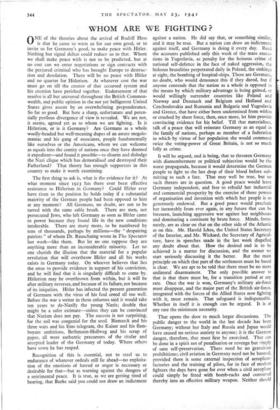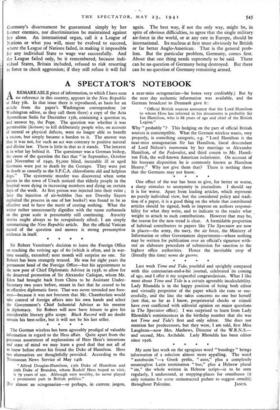WHOM ARE WE FIGHTING?
ONE of the theories about the arrival of Rudolf Hess is that he came to warn us for our own good, or to invite us for Germany's good, to make peace with Hitler. Nothing but signal defeat could reduce us to that. Whom we shall make peace with is not to be predicted, but at no cost can we enter negotiations or sign contracts with the perjured criminal who has brought Europe to destruc- tion and desolation. There will be no peace with Hitler and no quarter for Hitlerism. At whatever cost the war must go on till the creator of that accursed system and his creation have perished together. Endorsement of that resolve is all but universal throughout the British Common- wealth, and public opinion in the not yet belligerent United States gives assent by an overwhelming preponderance. So far so good. But here a sharp, unfortunate and poten- tially perilous divergence of view is revealed. We are not, it seems, agreed yet as to whom we are fighting. Is it Hitlerism, or is it Germany? Are Germans as a whole woolly-headed but well-meaning dupes of an astute megalo- maniac and his gang of associates, people fundamentally like ourselves or the Americans, whom we can welcome as equals into the comity of nations once they have deemed it expedient—and found it possible—to disarm and dislodge the Nazi clique which has demoralised and destroyed their Fatherland? That theory has enough supporters in this country to make it worth examining.
The first thing to ask is, what is the evidence for it? At what moment since 1923 has there ever been effective resistance to Hitlerism in Germany? Could Hitler ever have risen to the position he holds today if a substantial majority of the German people had been opposed to him at any moment? All Germans, no doubt, are not to be tarred with the same sable brush. There are men, not persecuted Jews, who left Germany as soon as Hitler came to power because they found life in the new conditions intolerable. There are many more, to be numbered by tens of thousands, perhaps by millions—the "despairing patriots" of whom Dr. Rauschning wrote in The Spectator last week—like them. But let no one suppose they are anything more than an inconsiderable minority. Let no one cherish the illusion that the material for a popular revolution that will overthrow Hitler and all his works exists in Germany today. On whoever believes that lies the onus to provide evidence in support of his conviction, and he will find that it is singularly difficult to come by. Hitlerism may be overthrown from within, but it will be after military reverses, and because of its failure, not because of its iniquities. Hitler has infected the present generation of Germans with the virus of his foul creed all too well. Before the war a writer in these columns said it would take ten years to de-Nazify the young Nazis; double that might be a safer estimate—unless they can be convinced that Nazism does not pay. The success is not surprising, for the soil was congenial for the seed. Bismarck and his three wars and his Ems telegram, the Kaiser and his flam- boyant ambitions, Bethmann-Hollweg and his scrap of paper, all were authentic precursors of the titular and accepted leader of the Germany of today. Where others have sown he has reaped.
Recognition of this is essential, not to steel us to endurance of whatever ordeals still lie ahead—no exploita- tion of the emotions of hatred or anger is necessary or desirable for that—but as warning against the dangers of a sentimental peace. It is true, as we are getting tired of hearing, that Burke said you could not draw an indictment against a nation. He did say that, or something similar, and it may be true. But a nation can draw an indictment against itself, and Germany is doing it every day. Read the accounts published only this week of the mass execu- tions in Yugoslavia, as penalty for the heinous crime of national self-defence in the face of naked aggression, the hideous brutalities perpetrated daily in Poland, the sinkings at sight, the bombing of hospital-ships. There are Germans, no doubt, who would denounce this if they dared, but if anyone contends that the nation as a whole is opposed to the means by which military advantage is being gained, or would willingly surrender countries like Poland and Norway and Denmark and Belgium and Holland and Czechoslovakia and Rumania and Bulgaria and Yugoslavia and Greece, that have either been undermined from within or crushed by sheer force, then, once more, let him provide convincing evidence for his belief. Till that materialises, talk of a peace that will reinstate Germany as an equal in the family of nations, perhaps as member of a federation in which by virtue of her population she would command twice the voting-power of Great Britain, is not so much folly as crime.
It will be argued, and is being, that to threaten Germany with dismemberment or political subjection would be the worst propaganda, because it would determine the German people to fight to the last drop of their blood before sub- mitting to such a fate. That may well be true, but no such threats are in question. A good peace would leave Germany independent, and free to rebuild her industrial and commercial prosperity by the exercise of those powers of organisation and invention with which her people is so generously endowed. But a good peace would preclude her inexorably from ever again, in any future that can be foreseen, launching aggressive war against her neighbours and dominating a continent by brute force. Minds, fortu- nately, are as clear on that on the other side of the Atlantic as on this. Mr. Harold Ickes, the United States Secretary of the Interior, and Mr. Wickard, the Secretary of Agricul- ture, have in speeches made in the last week dispelled any doubt about that. How the desired end is to be achieved is a matter for discussion, and the sooner we start seriously discussing it the better. But the main principle on which that part of the settlement must be based is clear. We are apt to be told that there must be no more unilateral disarmament. The only possible answer to that is that there must be, for a transition period at any rate. Once the war is won, Germany's military air-force must disappear, and the major part of the British air-force, integrated with the forces of the Allied States now fighting with it, must remain. That safeguard is indispensable. Whether in itself it is enough can be argued. It is at any rate the minimum necessity.
That opens the door to much larger discussions. The public danger to the world in the last decade has been Germany; without her Italy and Russia and Japan would have caused no serious anxiety to anyone; it is the German danger, therefore, that must first be exorcised. That can be done in a spirit not of penalisation or revenge but -imply of sane self-preservation. There need be no gratuitous prohibitions; civil aviation in Germany need not be banned, provided there is some external inspection of aeroplane- factories and the training of pilots, for in face of modern fighters the days have gone for ever when a civil aeroplane could simply be fitted with bomb-racks and converted thereby into an effective military weapon. Neither should Germany's disarmament be guaranteed simply by her former enemies, nor discrimination be maintained against her alone. An international organ, call it a League of Nations or what you will, must be evolved to succeed, where the League of Nations failed, in making it impossible for any individual State to wage war successfully. And the League failed only, be it remembered, because indi- vidual States, Britain included, refused to risk resorting to force to check aggression; if they still refuse it will fail again. The best way, if not the only way, might be, in spite of obvious difficulties, to agree that the single military air-force in the world, or at any rate in Europe, should be international. Its nucleus at first must obviously be British or far better Anglo-American. That is the general prob- lem. But the particular problem, Germany, comes first. About that one thing needs supremely to be said. There can be no question of Germany being destroyed. But there can be no question of Germany remaining armed.































 Previous page
Previous page